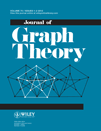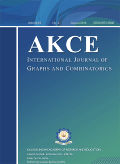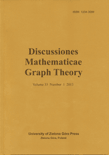
Australasian Journal of Combinatorics
Scope & Guideline
Unlocking the Secrets of Combinatorial Complexity
Introduction
Aims and Scopes
- Combinatorial Structures and Designs:
Research on various combinatorial configurations, including designs, graphs, and hypergraphs, exploring their properties, construction methods, and applications. - Graph Theory:
A significant focus on graph-related problems, including graph coloring, domination, connectivity, and extremal graph theory, which addresses the interplay between combinatorial properties and graph structures. - Enumerative Combinatorics:
Studies that involve the counting and enumeration of combinatorial objects, such as permutations, paths, and partitions, often employing innovative counting techniques and generating functions. - Algebraic Combinatorics:
Exploration of the connections between combinatorial structures and algebraic techniques, including the use of algebraic methods in the study of graphs and designs. - Algorithmic Combinatorics:
Research that focuses on the development and analysis of algorithms for combinatorial problems, emphasizing computational efficiency and complexity. - Applications of Combinatorics:
Investigations into the practical applications of combinatorial theory in areas such as computer science, optimization, and mathematical biology.
Trending and Emerging
- Complexity and Algorithmic Challenges:
An increasing number of papers are addressing the computational complexity of combinatorial problems, highlighting the importance of algorithmic approaches in tackling intricate combinatorial structures. - Interdisciplinary Applications:
Emerging research is focusing on the applications of combinatorial techniques in diverse fields such as bioinformatics, network theory, and optimization, indicating a trend towards bridging combinatorial mathematics with real-world problems. - Probabilistic and Randomized Methods:
There is a notable rise in the use of probabilistic methods and random structures in combinatorial research, reflecting a growing interest in understanding the behavior of combinatorial objects under random conditions. - Graph Theory Innovations:
Recent publications have increasingly focused on novel graph-theoretic concepts and properties, such as new types of graph decompositions and advanced coloring techniques, which are at the forefront of current research. - Combinatorial Optimization:
Research on optimization problems within combinatorial frameworks is trending, with a focus on developing efficient solutions and understanding their theoretical underpinnings.
Declining or Waning
- Classical Combinatorial Games:
There is a noticeable decrease in publications focused on classical combinatorial games, such as Nim or Sprouts, which were once popular topics but seem to have less frequent exploration in recent issues. - Elementary Combinatorial Proofs:
The trend of publishing papers that focus solely on elementary proofs for established combinatorial identities and results is declining, as the journal shifts towards more complex and interdisciplinary approaches. - Combinatorial Geometry:
Research in combinatorial geometry, which deals with geometric configurations and their combinatorial properties, appears to be less frequently represented in recent issues.
Similar Journals

Transactions on Combinatorics
Advancing Combinatorial Insights for a Global CommunityTransactions on Combinatorics is an esteemed academic journal dedicated to advancing the field of combinatorial mathematics. Published by UNIV ISFAHAN, VICE PRESIDENT RESEARCH & TECHNOLOGY, this journal has been an Open Access platform since 2012, ensuring that innovative research is freely available to scholars across the globe. With an ISSN of 2251-8657 and an E-ISSN of 2251-8665, it fosters a community for researchers to disseminate their findings within the realms of Computational Theory and Discrete Mathematics. The journal has been classified in the Q4 category for both its major fields in 2023 and holds notable Scopus rankings that reflect its growing influence in the academic community, despite currently being in the lower quartiles. The journal covers a diverse range of topics from theoretical frameworks to practical applications, making it a valuable resource for researchers, professionals, and students who are passionate about combinatorics. Addressed from DEPT PRINTING & PUBLISHING MAGAZINES, HEZAR-JARIB AVE, ISAFAHAN 81746-73441, IRAN, it stands as a beacon for collaborative research and knowledge sharing in this essential field.

JOURNAL OF GRAPH THEORY
Connecting Ideas Through Rigorous Peer ReviewJOURNAL OF GRAPH THEORY, published by WILEY, stands as a pivotal resource in the fields of Discrete Mathematics and Combinatorics, as well as Geometry and Topology. Since its inception in 1977, this esteemed journal has fostered the dissemination of influential research, currently categorized in the prestigious Q1 quartile according to the latest metrics for 2023. With an ISSN of 0364-9024 and an E-ISSN of 1097-0118, it caters to a global readership of researchers, professionals, and students dedicated to advancing their knowledge in graph theory. By maintaining a strong rank in Scopus—39th out of 106 in Geometry and Topology, and 38th out of 92 in Discrete Mathematics and Combinatorics—it reflects its significance and impact within the academic community. Although it does not offer open-access options, its rigorous peer-review process ensures that only high-quality original research is published, thus reinforcing its reputation as a leading journal in this mathematical domain.

Communications in Combinatorics and Optimization
Catalyzing Knowledge Exchange in Combinatorial ScienceCommunications in Combinatorics and Optimization is a prestigious open-access journal published by Azerbaijan Shahid Madani University, focused on advancing research in the fields of combinatorial mathematics and optimization. Since its inception in 2016, the journal has established a reputation for disseminating high-quality research, achieving a commendable Q2 ranking in both Control and Optimization and Discrete Mathematics and Combinatorics as of 2023. With a Scopus ranking of #13 in Discrete Mathematics and Combinatorics, it is positioned in the top 14% of its field, underscoring its significance in the academic community. By providing unrestricted access to its articles, the journal promotes the widespread dissemination of knowledge, fostering collaboration and innovation among researchers, professionals, and students around the globe. Based in Iran, the journal continues to contribute to the global discourse on effective combinatorial and optimization techniques that address contemporary challenges.

JOURNAL OF ALGEBRAIC COMBINATORICS
Fostering scholarly dialogue in the realm of algebraic combinatorics.JOURNAL OF ALGEBRAIC COMBINATORICS, published by SPRINGER, stands as a premier resource in the fields of algebra and combinatorics, playing a pivotal role in advancing research in these disciplines. With an esteemed impact factor reflective of its academic rigor, it holds a prestigious Q1 ranking in both Algebra and Number Theory, as well as in Discrete Mathematics and Combinatorics, according to 2023 assessments. Established in 1992, this journal features contributions from leading experts worldwide, offering insights into the latest developments and methodologies. Although not an open-access journal, it provides a wealth of valuable information and research findings focusing on combinatorial structures, theory, and applications that are essential for advancing academic inquiry. As a vital publication for researchers, professionals, and students alike, JOURNAL OF ALGEBRAIC COMBINATORICS continues to shape the conversation within the mathematical community and beyond, making it indispensable for those engaged in the dynamic landscape of mathematical sciences.

DISCRETE MATHEMATICS AND THEORETICAL COMPUTER SCIENCE
Innovating Research in Discrete Structures and Computational TheoryDISCRETE MATHEMATICS AND THEORETICAL COMPUTER SCIENCE, published by DISCRETE MATHEMATICS THEORETICAL COMPUTER SCIENCE in France, stands as a significant open-access journal since 1997, publishing innovative research articles within the intersecting disciplines of discrete mathematics and theoretical computer science. With an ISSN of 1462-7264 and an E-ISSN of 1365-8050, this journal aims to provide a platform for scholarly discourse and dissemination of knowledge, making it accessible to a global audience. It is recognized for its contributions, achieving a Q2 ranking in both Computer Science (Miscellaneous) and Discrete Mathematics and Combinatorics, alongside a Q3 ranking in Theoretical Computer Science as of 2023. The journal’s rigorous selection process ensures that only high-quality research is published, promoting advancements in these critical areas of study. Researchers, professionals, and students alike can benefit from its comprehensive articles that not only enhance theoretical understanding but also foster practical applications in the ever-evolving landscape of computer science.

Aequationes Mathematicae
Unveiling New Perspectives in Applied and Discrete Mathematics.Aequationes Mathematicae is a distinguished academic journal published by SPRINGER BASEL AG, focusing on the dynamic fields of Applied Mathematics, Discrete Mathematics, and Combinatorics. Since its inception in 1968, the journal has served as a vital platform for disseminating high-quality research, with Converged Years expected to extend to 2024. With an impressive Q2 ranking in multiple mathematical disciplines as of 2023, Aequationes Mathematicae is positioned within the top half of its field, reflecting its reputation for excellence. Spanning the globe from its base in Basel, Switzerland, this journal is ideal for researchers, professionals, and students seeking to advance their knowledge and contribute to ongoing discussions within mathematics. While it does not currently offer Open Access options, readers can still access an extensive archive of impactful studies that bolster its standing within the academic community.

Journal of Combinatorial Algebra
Connecting Minds in Discrete Mathematics and Number TheoryThe Journal of Combinatorial Algebra, published by the European Mathematical Society (EMS), is a pioneering open-access journal dedicated to advancing research in the fields of Algebra and Number Theory, as well as Discrete Mathematics and Combinatorics. Since its inception in 2018, the journal has been committed to promoting high-quality, rigorous research, evidenced by its 2023 scopus rankings placing it in the second quartile across both disciplines. It serves as a vital platform for academics, researchers, and students to share innovative findings, methodologies, and theoretical advancements within combinatorial algebra, facilitating collaboration and knowledge dissemination in the mathematical community. With its open access policy adopted in 2021, the journal ensures that its content is freely available to a global audience, further enriching the landscape of mathematical research. The journal's editorial board, composed of leading experts, guarantees the integrity and academic excellence of published articles, making it an essential resource for those engaged in the dynamic fields of combinatorics and algebra.

AKCE International Journal of Graphs and Combinatorics
Connecting Ideas through Innovative Mathematical Research.AKCE International Journal of Graphs and Combinatorics, published by TAYLOR & FRANCIS LTD, serves as a significant platform in the field of Discrete Mathematics and Combinatorics. With its commitment to open access since 2015, the journal ensures that cutting-edge research is readily available to a global audience, promoting the dissemination of knowledge and high-quality scholarship. Recognized for its impact in the discipline, the journal is currently ranked Q3 in its category for 2023 and holds a commendable Scopus ranking, falling within the 69th percentile. Researchers, professionals, and students alike will find invaluable insights and contributions in this journal, which spans a wide range of topics related to graph theory and combinatorial structures. Operating from its base in India, and converging from 2011 to 2024, the AKCE International Journal invites submissions that push the boundaries of mathematical exploration and foster innovative methodologies in a rapidly evolving field.

Armenian Journal of Mathematics
Unveiling Insights in Mathematical SciencesArmenian Journal of Mathematics is a premier open-access publication dedicated to the dissemination of research in the field of mathematics. Published by the National Academy of Sciences of the Republic of Armenia, this journal has been a significant platform since its inception, freely accessible to readers since 2008. It aims to foster scholarly communication by providing a forum for innovative research, particularly in general mathematics and its miscellaneous applications. As of 2023, the journal is ranked in the fourth quartile of mathematics journals according to Scopus metrics, reflecting its growing presence in the academic community. Although the H-index and specific scope details are currently unavailable, the journal's commitment to promoting high-quality mathematic discourse supports the development of the mathematical sciences within Armenia and beyond. We invite researchers, professionals, and students to explore the Armenian Journal of Mathematics for valuable insights and contributions that advance the understanding of mathematical theories and applications.

Discussiones Mathematicae Graph Theory
Unlocking Innovations in Applied MathematicsDiscussiones Mathematicae Graph Theory is a prestigious peer-reviewed journal published by UNIV ZIELONA GORA, specializing in the dynamic fields of Graph Theory, Discrete Mathematics, and Applied Mathematics. With an ISSN of 1234-3099 and an E-ISSN of 2083-5892, this Open Access journal has been providing unrestricted access to its content since 2013, promoting widespread dissemination and engagement in academic research. Established in 2009 and continuing its influential publication through 2024, Discussiones Mathematicae Graph Theory is committed to fostering collaborations and innovations among researchers, professionals, and students alike. Its impressive category quartiles for 2023 show it ranks within the Q3 range for both Applied Mathematics and Discrete Mathematics and Combinatorics, as well as good positions within the Scopus rankings, ensuring its critical relevance in the mathematical community. By continuously highlighting groundbreaking research in graph theory, this journal stands as a vital resource for anyone looking to advance their knowledge and contribute to the evolving landscape of mathematics.